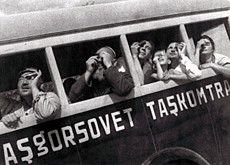Curtain falls on cultural ties with Eastern Europe

Switzerland’s arts council has played an important role in helping to rebuild cultural life in several former Soviet bloc countries since the fall of the Iron Curtain.
But as Poland, Hungary, Slovakia and the Czech Republic prepare to join the European Union on May 1, their Swiss partner is facing cutbacks.
Switzerland was one of the first countries to set up a fund to help the region’s transition to democracy and economic stability after the fall of the Berlin Wall in 1989.
The development of cultural life and a free press in the former Soviet bloc was an important focus for Swiss aid and the country’s arts council, Pro Helvetia.
The first beneficiaries of Swiss aid were the countries which are now preparing to join the EU: Poland, Hungary, the Czech Republic and Slovakia.
“Switzerland’s contribution was exceptional,” says Ula Kropiwiec who heads Pro Helvetia’s Polish arm.
“It was committed to promoting the region’s cultural life without stamping its mark, when other Western countries were trying to export their own culture.”
Concerts
Dozens of exhibitions, concerts, plays and film festivals were staged during the 1990s with the help of Pro Helvetia’s branches in Budapest, Krakow, Prague and Bratislava.
The agency came to the aid of many artists who were struggling to finance their projects, but who were also trying to find new values and points of reference.
“During the Communist era, many artists and intellectuals saw their role as one of resistance against dictatorship,” explains Kropiwiec.
Swiss Radio International was commissioned to organise training for hundreds of journalists from the former Soviet bloc who suddenly found themselves working in an environment free of censorship.
Jozsef Laszlo, a former journalist with Hungarian state radio, say he is still grateful for the chance he was given to train at swissinfo/Swiss Radio International a decade ago.
“It was a fantastic scheme that enabled [me] to experience something completely new,” he says.
Cultural exchange
But since 1999, when the economic situation in the region became more stable, Pro Helvetia’s involvement has switched to one of cultural exchange.
“Pro Helvetia is still heavily involved in many cultural activities. Although it gives less financial support, it maintains a lot of ties and contacts,” says Kropiwiec.
These contacts have proved vital in promoting a cultural exchange with a part of Europe which had little contact with the outside world for half a century.
“At the start, we had the impression that Western Europeans looked down on our culture,” explains Kropiwiec. “But now they are changing their views and are starting to understand our historical and artistic heritage.”
Uncertain future
Marlis Lami, who coordinates Pro Helvetia’s projects in the region, agrees that there is now a more open cultural dialogue with Western Europe.
“That’s also true of Switzerland. For instance, Swiss architecture has already gained a strong reputation here,” says Lami. “We’re always getting requests to stage exhibitions of great Swiss architects.”
But a new beginning on May 1 for the likes of Poland, Hungary, Slovakia and the Czech Republics will probably coincide with end of Pro Helvetia.
The organisation is likely to close its doors next year because of budget problems.
“It’s very sad because I think there’s still a big gulf to fill between the two sides,” says Marti. “And there are gaps that only cultural and artistic exchanges can fill.”
swissinfo, Armando Mombelli
Pro Helvetia works to promote Swiss culture abroad and cultural dialogue between Switzerland’s four linguistic regions.
It has 15 branches abroad.
It spends SFr700,000 ($545,830) a year on promoting culture in Poland, Hungary, the Czech Republic and Slovakia.

In compliance with the JTI standards
More: SWI swissinfo.ch certified by the Journalism Trust Initiative












You can find an overview of ongoing debates with our journalists here . Please join us!
If you want to start a conversation about a topic raised in this article or want to report factual errors, email us at english@swissinfo.ch.